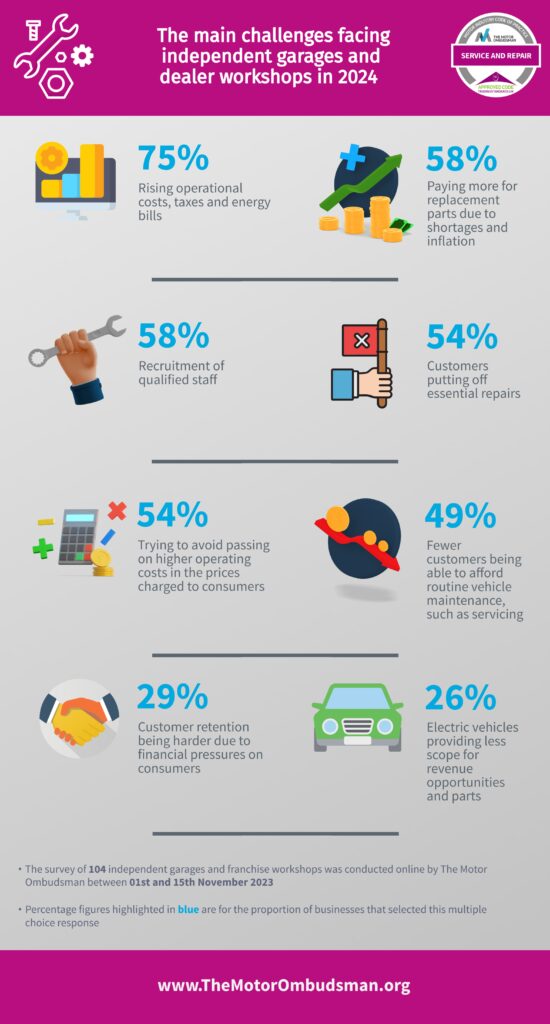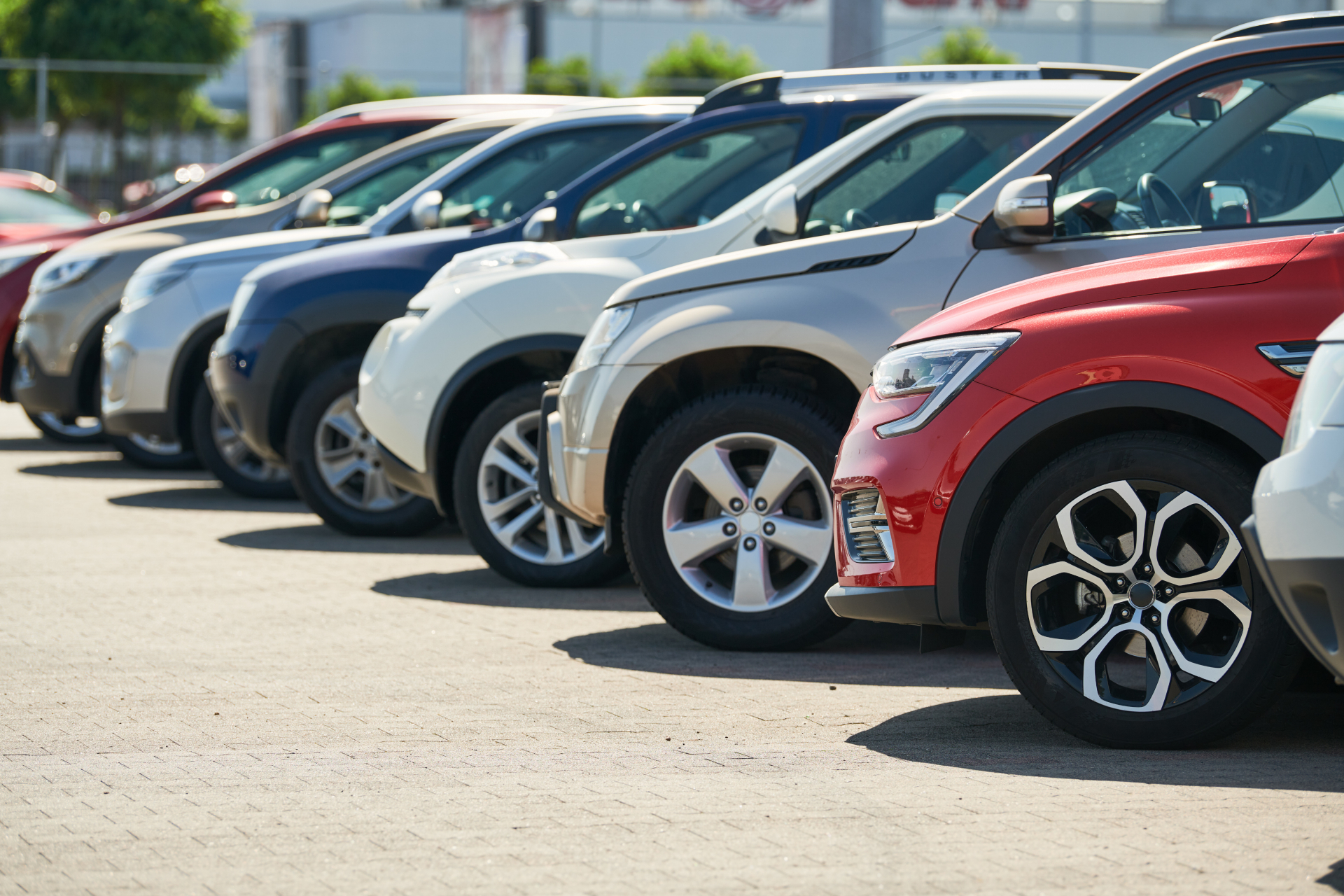Motor Ombudsman poll shows rising costs will pose biggest challenge for three-quarters of vehicle repairers in 2024
- Three-quarters (75%) of service and repair businesses polled foresee rising operational costs, taxes and energy bills to be the most significant operational challenge in 2024, followed by paying more for spare parts (58%), and recruiting qualified technicians to meet workload demands (58%)
- Customers putting off essential repairs, and vehicle owners being unable to afford routine maintenance, is also expected to affect the bottom line and customer footfall for around half of vehicle repairers this year
- The research equally revealed that 52% of businesses plan to invest in recruitment in 2024 to address staff shortages, which impacted 56% of survey respondents last year
- The Motor Ombudsman’s survey of independent garages and franchise dealer workshops provides an annual barometer of business sentiment on the UK’s service and repair sector
 The Motor Ombudsman’s annual survey of independent garages and franchise dealer workshops has revealed that rising operational costs, taxes and energy bills are set to be the most significant challenge for three-quarters of vehicle repairers during the coming year. This will be further compounded by the expectation that they will have to pay more than in 2023 for spare parts to fix customer vehicles, likely due to factors, such as shortages and inflation (58%), illustrating the headwinds that continue to face businesses in the UK’s service and repair sector.
The Motor Ombudsman’s annual survey of independent garages and franchise dealer workshops has revealed that rising operational costs, taxes and energy bills are set to be the most significant challenge for three-quarters of vehicle repairers during the coming year. This will be further compounded by the expectation that they will have to pay more than in 2023 for spare parts to fix customer vehicles, likely due to factors, such as shortages and inflation (58%), illustrating the headwinds that continue to face businesses in the UK’s service and repair sector.
In light of this increased expenditure, just over half of respondents (54%) stated that they would be confronted with the dilemma of having to raise prices in order to sustain a viable business that is costing more to run. This also comes at a time when garages foresee consumers putting off essential repairs (54%), and routine maintenance (49%) to save money, as household finances remain under strain. This mirrored the findings about the principal hurdles encountered in 2023, where 53% of businesses had witnessed customers avoid bringing their car in, so as to reduce the level of spend on their vehicles due to the widely-reported cost of living crisis.
Echoing the difficulty with recruiting additional technicians by 56% of repairers when questioned about the main factors that put them to the test last year, a greater proportion (58%) expressed the same concern when looking ahead to the next 12 months in 2024, as qualified and skilled mechanics remain an increasingly sought-after resource in the labour market. This also paints a more challenging picture for hiring staff, when The Motor Ombudsman’s own research showed that 50% of businesses struggled to recruit the technicians needed to meet demand in 2022.
With both new and used electric vehicles (EVs) increasing in popularity amongst consumers, and with fewer mechanical parts than petrol and diesel models, reducing the need for maintenance, 26% of repairers responded in the survey to say that battery-powered cars would provide less scope for additional revenue opportunities and replacement parts in 2024. However, this is encouragingly down from 32% seen in the same study about expectations ahead of 2023, as more businesses look to embrace new technologies and seek other revenue streams.
In terms of the positive developments that garages and workshops are seeking to bring to their business this year, over half (52%) said they would look to invest in recruitment to expand their workforce from a competitive pool. In addition, over a third of respondents (35%) explained that they will be considering refurbishing existing premises to improve the look and feel of the experience for customers, with a fifth planning to add workshop and MOT bays, as well as additional on-site electric vehicle charging points to accommodate growing demand for EVs. Furthermore, nearly a quarter stated they intend to participate in webinars and training courses to bring improvements in the way that they work across their organisation.
Bill Fennell, Chief Ombudsman and Managing Director of The Motor Ombudsman, said: “Our latest study presents a clear picture in that garages and workshops will still have to contend with a number of underlying challenges this year, with rising costs one of the most pertinent, as this ultimately affects their bottom line. This will need to be balanced with the need to remain competitive in order to deliver an attractive proposition to motorists, at a time when household budgets remain under strain.”
Bill added: “Accreditation to The Motor Ombudsman will continue to serve as an important and key point of differentiation for garages and workshops. This showcases a commitment to high standards of work and service, coupled with the added reassurance that there is an independent and impartial body on hand to help bring any unresolved disputes to a swift and fair conclusion at no charge to consumers.”
To view the businesses that are accredited to The Motor Ombudsman’s Service and Repair Code, visit www.TheMotorOmbudsman.org/Garage-Finder.
ENDS
Notes to editors
About the survey data
The Motor Ombudsman survey saw 104 service and repair businesses respond online between 01st and 15th November 2023. Read the full Motor Ombudsman Service and Repair 2023 review and 2024 outlook at:
www.TheMotorOmbudsman.org/useful-information/industry-insights
The infographic showing the main challenges set to be faced by independent garages and franchise dealer workshops in 2024 can be downloaded here.



